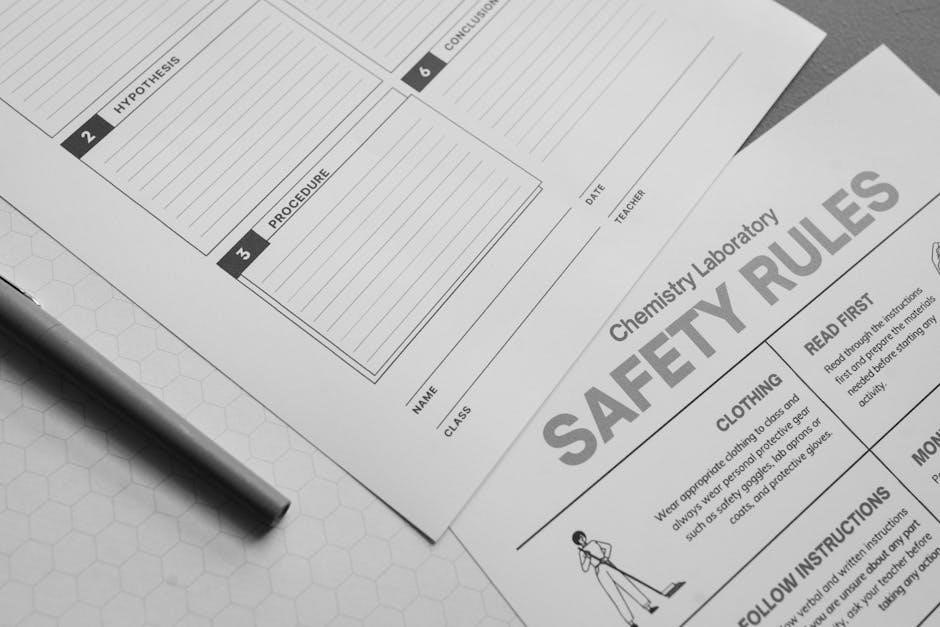The Judicial College Guidelines 16th Edition provides updated frameworks for assessing general damages in personal injury cases‚ offering revised brackets to reflect inflation and new claim categories. Free PDF downloads are available through authorized sources‚ ensuring accessibility for legal professionals.
1.1 Overview of the Judicial College Guidelines
The Judicial College Guidelines are a cornerstone for assessing general damages in personal injury and clinical negligence cases across the UK. Published by the Judicial College‚ these guidelines provide a framework for valuing injuries‚ ensuring consistency and fairness in court awards. They include detailed brackets for various types of injuries‚ reflecting current judicial decisions and inflation adjustments. The guidelines are updated periodically to account for changes in the law and economic factors. While not binding‚ they are widely accepted as a authoritative reference by courts and legal practitioners. The 16th Edition introduces new categories‚ such as sexual abuse claims‚ and revised valuations for whiplash injuries. Access to the guidelines is available through free PDF downloads‚ making them accessible to all legal professionals.
1.2 Significance of the 16th Edition
The 16th Edition of the Judicial College Guidelines marks a critical update in personal injury law‚ reflecting inflationary adjustments and evolving legal precedents. It introduces new categories for sexual and physical abuse claims‚ ensuring victims receive fair compensation. The revised guidelines also address whiplash and minor injury valuations‚ aligning with current judicial practices. This edition is essential for legal professionals‚ providing a standardized framework for damages assessment. Its publication underscores the commitment to maintaining fairness and consistency in compensation awards. The free PDF download option ensures widespread accessibility‚ making it a vital resource for litigators‚ courts‚ and insurers.
1.3 Key Features of the Updated Guidelines
The 16th Edition of the Judicial College Guidelines introduces several key updates‚ including inflation-adjusted damages brackets and new categories for sexual and physical abuse claims. It also revises valuations for whiplash and minor injuries‚ providing clearer guidance for litigators. The guidelines now include a dedicated category for psychiatric and psychological damage‚ reflecting modern legal trends. Additionally‚ the free PDF download option ensures accessibility for legal professionals. These updates aim to enhance consistency and fairness in compensation awards‚ making the 16th Edition an indispensable resource for personal injury and clinical negligence cases. Its practical insights and updated frameworks are designed to aid accurate damages assessment;

Key Changes in the 16th Edition
The 16th Edition includes updated damages brackets for inflation‚ new categories for sexual and physical abuse claims‚ and revised valuations for whiplash and minor injuries.
2.1 Updated Damages Brackets for Inflation
The 16th Edition incorporates inflation-adjusted damages brackets to reflect current economic conditions. These updates ensure compensation remains fair and aligned with rising costs of living. The brackets now account for Consumer Price Index (CPI) increases‚ providing a more accurate basis for assessing general damages. For instance‚ minor knee injuries and modest leg injuries have revised upper limits‚ such as £2‚750 for knee injuries and £2‚990 for leg injuries. These adjustments help maintain the real value of compensation for claimants. The updated figures are detailed in the Judicial College Guidelines 16th Edition PDF‚ available for free download through authorized sources.

2.2 New Categories for Sexual and Physical Abuse Claims
The 16th Edition introduces dedicated categories for sexual and physical abuse claims‚ providing clearer guidance for valuing these sensitive cases. These new categories‚ included in Chapter 4‚ address psychiatric and psychological damage‚ offering specific brackets to reflect the severity of such injuries. This update ensures that compensation aligns with the unique nature of these claims‚ acknowledging their profound impact on victims. The revised categories help legal professionals assess damages more accurately‚ promoting consistency in court decisions. The Judicial College Guidelines 16th Edition PDF details these changes‚ available for free download through authorized sources.
2.3 Revisions in Whiplash and Minor Injury Valuations
The 16th Edition updates valuation guidelines for whiplash and minor injuries‚ reflecting inflation and judicial decisions. New brackets provide clearer ranges‚ such as up to £2‚450 for injuries recovering within three months. These revisions aim to address inconsistencies in minor injury claims‚ ensuring fairer compensation. The updated guidelines emphasize the importance of precise medical evidence in assessing injury severity. Legal professionals can access these revised valuations in the Judicial College Guidelines 16th Edition PDF‚ available for free download‚ helping practitioners apply the new standards effectively in court.

Importance of the Guidelines in Legal Practice
The Judicial College Guidelines are essential for legal professionals‚ providing standardized frameworks to assess general damages consistently. They ensure fairness and accuracy in personal injury and clinical negligence claims.
3.1 Role in Assessing General Damages

The Judicial College Guidelines 16th Edition play a pivotal role in assessing general damages by providing standardized frameworks for valuing injuries; They offer updated brackets reflecting inflation and include new categories for sexual and physical abuse claims. Legal professionals rely on these guidelines to ensure consistency and fairness in compensation assessments. The guidelines are not binding but serve as a critical reference‚ helping courts and practitioners evaluate the severity of injuries and determine appropriate awards. By incorporating real-world judicial decisions‚ they enhance the accuracy and transparency of damages calculations in personal injury and clinical negligence cases.
3.2 Factors Influencing Damages Valuation
The Judicial College Guidelines 16th Edition outlines key factors influencing damages valuation‚ including injury severity‚ recovery duration‚ and impact on lifestyle. Economic losses‚ long-term effects‚ and unique circumstances of each case are also considered. The guidelines emphasize the importance of consistency and fairness‚ ensuring that awards align with judicial precedents. New categories for sexual and physical abuse claims introduce additional factors‚ such as psychological trauma and its lasting effects. These elements help practitioners apply the guidelines accurately‚ ensuring transparency and equity in compensation decisions for personal injury and clinical negligence cases.
3.3 Impact on Personal Injury and Clinical Negligence Claims

The Judicial College Guidelines 16th Edition significantly influences the valuation of damages in personal injury and clinical negligence claims. The updated brackets account for inflation‚ ensuring awards reflect current economic conditions. New categories for sexual and physical abuse claims provide clearer guidance‚ leading to more consistent payouts. The revised whiplash and minor injury valuations address disparities in compensation‚ offering a more precise framework for assessors. These changes enhance transparency and fairness‚ aiding litigators‚ courts‚ and insurers in determining equitable settlements. The guidelines remain a pivotal resource for achieving consistency in damages awards across the UK.

How to Access the Judicial College Guidelines

The Judicial College Guidelines 16th Edition can be accessed through authorized sources‚ including free PDF downloads from legal databases like Westlaw and LexisNexis‚ or purchased from publishers.
4.1 Authorized Sources for Download
The Judicial College Guidelines 16th Edition can be downloaded from authorized sources such as the Oxford University Press website‚ Westlaw‚ or LexisNexis. These platforms provide secure and reliable access to the PDF version of the guidelines. Additionally‚ the Judicial College website offers direct links to purchase or download the document. While some sources may offer free PDF downloads‚ it’s essential to verify their authenticity to ensure compliance with copyright laws. Always rely on reputable legal databases or official publishers to access the guidelines.
4.2 Availability of Free PDF Downloads
While the Judicial College Guidelines 16th Edition is primarily available through paid sources‚ some websites offer free PDF downloads. However‚ these may not always be reliable or up-to-date. To ensure authenticity‚ legal professionals should verify the source. Official publishers like Oxford University Press or legal databases such as Westlaw and LexisNexis provide secure access. Free versions may lack essential updates or formatting‚ potentially leading to inaccuracies. Always prioritize verified sources to maintain compliance with the latest legal standards.
4.3 Digital Access Through Legal Databases
The Judicial College Guidelines 16th Edition is accessible digitally through prominent legal databases such as Westlaw and LexisNexis. These platforms provide secure‚ up-to-date‚ and searchable versions of the guidelines‚ enhancing efficiency for legal professionals. Subscribers can easily navigate and reference specific sections‚ ensuring accurate damages assessments. Digital access also offers the convenience of regular updates‚ reflecting the latest legal developments. Legal databases are indispensable tools for practitioners needing reliable and immediate access to the guidelines‚ making them a cornerstone of modern legal practice in personal injury and clinical negligence cases. This digital availability ensures consistency and accuracy in legal proceedings.

Practical Implications of the 16th Edition
The 16th Edition introduces inflation-adjusted damages brackets and new claim categories‚ impacting how legal professionals assess compensation. This ensures consistency and fairness in personal injury and clinical negligence cases.
5.1 Adjustments for Inflation in Damages Awards
The 16th Edition incorporates inflation-adjusted damages brackets‚ ensuring compensation aligns with current economic conditions. This adjustment reflects rising living costs and maintains the real value of awards. For instance‚ knee injuries now have higher brackets‚ with modest injuries valued up to £2‚750‚ a significant increase from previous figures. Similarly‚ minor leg injuries see adjustments‚ emphasizing the need to account for inflation in personal injury claims. These updates ensure fairness and consistency‚ helping courts and practitioners assess damages accurately while considering economic fluctuations. The revised figures provide a clear framework for valuing injuries‚ ensuring claimants receive appropriate compensation.
5.2 Implications for Litigators and Courts
The 16th Edition significantly impacts litigators and courts by providing updated frameworks for damages assessment. It ensures consistency in valuing injuries‚ reflecting current judicial trends and economic factors. Litigators must adapt their strategies‚ referencing the new brackets to negotiate settlements effectively. Courts now have clearer guidelines to apply uniformly‚ reducing discrepancies in awards. The revised categories‚ such as sexual abuse claims‚ offer precise benchmarks‚ aiding judicial decision-making. Practitioners are urged to familiarize themselves with these updates to ensure accurate valuations and maintain fairness in personal injury and clinical negligence cases. This alignment enhances transparency and efficiency in legal proceedings.
5.3 Future Updates and Editions
The Judicial College Guidelines are expected to continue evolving‚ with future editions incorporating adjustments for inflation and emerging legal precedents. The 17th Edition has already been released‚ featuring updated damages brackets and new categories to reflect current judicial trends. These updates ensure the guidelines remain relevant and fair‚ aligning with societal and economic changes. Legal professionals are encouraged to stay informed about upcoming editions‚ as they will play a crucial role in maintaining consistency in damages assessments. Regular reviews and updates will help the guidelines adapt to new challenges and case law developments.



